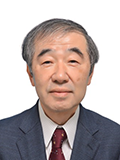Hodaka Kawahata

Commendation
For outstanding contributions to the study of biogeochemical cycles in the Earth’s surface environments and its applications, including advancements in paleoclimatology, paleoceanography, and interdisciplinary research
A list of five major papers
- Kawahata, H., Okamoto, T., Matsumoto, E. and Ujiie, H. (2000) Fluctuations of eolian flux andocean productivity in the mid-latitude north Pacific during the last 200 kyr. Quaternary Science andReviews, 19, 1279-1291.
- Kawahata, H., Nishimura, A. and Gagan, M. (2002) Seasonal change in foraminiferal productionin the western equatorial Pacific warm pool: evidence from sediment trap experiments. Deep-SeaResearch II, 49, 2783-2801.
- Kuroyanagi, A. and Kawahata, H. (2004) Vertical distribution of living planktonic foraminifera inthe Japan Sea and northwestern North Pacific Ocean. Marine Micropaleontology, 53, 173-196.
- Kawahata, H. Ohta, H., Inoue, M. and Suzuki, A. (2004) Endocrine disrupter nonylphenol andbisphenol A contamination in Okinawa and Ishigaki Islands, Japan – within coral reefs and adjacentriver mouths. Chemosphere, 55, 1519-1527.
- Kawahata, H., Matsuoka, M., Togami, A., Harada, N., Murayama, M., Yokoyama, Y., Miyairi, Y.,Matsuzaki, H., and Tanaka, Y. (2017) Climatic change and its influence on human society in westernJapan during the Holocene. Quaternary International, 440, 102-117.
Major achievements
Dr. Hodaka Kawahata has significantly contributed to research on the carbon cycle and biogeochemical processes in the Earth’s surface environment, advancing studies on past, present, and future environmental changes. Through sediment trap observations, analyses of corals and freshwater systems, and precise culture experiments on biomineralization, he has gained a deep understanding of the factors governing environmental variability and developed high-precision methods for extracting past environment information. By applying these techniques to seafloor sediments and corals, he has conducted high-resolution studies in paleoclimatology and paleoceanography, as well as research on the response of calcifying organisms to ocean acidification driven by human activities. Furthermore, Dr. Kawahata has expanded interdisciplinary research beyond the natural sciences, integrating insights from humanities and social sciences to explore human migration and societal evolution. In addition to his research achievements, he has played a vital role in mentoring numerous researchers. Furthermore, he has made significant contributions to the establishment and promotion of the journal Progress in Earth and Planetary Science (PEPS), enhancing the international dissemination of academic research from Japan.
Nominator
Harue Masuda
Supporters
Tetsuro Urabe, Atsushi Suzuki, Naohiko Ohkouchi
